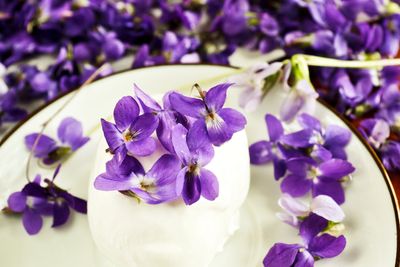Are Violets Edible?
Throughout the United States, common blue violets can be seen growing along roadsides, in shady woodland areas, and in fields. Other species of the Viola family can also be found, though usually grown as ornamental flowers in mixed plantings with vegetables or in flower borders. One thing which remains constant, however, is that violet flower uses are abundant. So, can you eat violets? Indeed, you can! Violets, both the leaves and flowers, contain high amounts of vitamin C and vitamin A. The edible violet plant can be used to make syrups, brew teas, and in baked desserts. Flowers can be added to salads and soups as garnish. Moderation is important, as this plant does contain a compound called saponin, so eating violet flowers and leaves in excess may cause digestive issues. Despite this, multitudes of herbalists praise violets for their relevance and importance as an edible plant.
About Edible Violet Plants
Commonly found growing within ill-managed lawns and tolerant to a wide range of temperatures, most violets are grown as short-lived perennials or cool season annual flowers. This means that violets are often one of the first flowers to bloom in spring and early summer. When picking edible violet plants, it is first important to properly identify the plants. As always, it is crucial to properly research before picking any flowers and/or leaves so you know that you’re harvesting the correct plant. When foraging for edible flowers, safety should be the number one priority. Often, forage classes may be offered by local agriculture extension offices. A local plant field guide will also be helpful in this process. Never eat anything without complete certainty that it is safe for consumption. Lastly, it is important to note that edible violets should NOT be confused with African violets. Despite the similarity in the name, common violets (Viola) and African violets are not related. Disclaimer: The content of this article is for educational and gardening purposes only. Before using or ingesting ANY herb or plant for medicinal purposes or otherwise, please consult a physician or a medical herbalist for advice.
